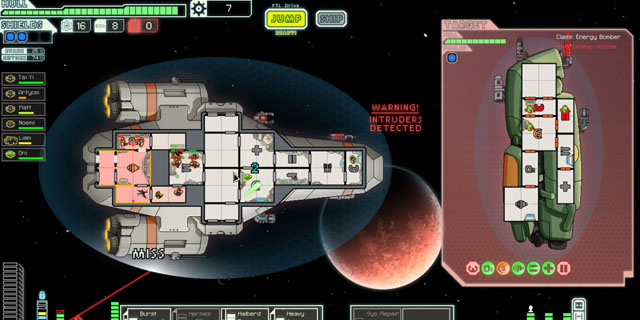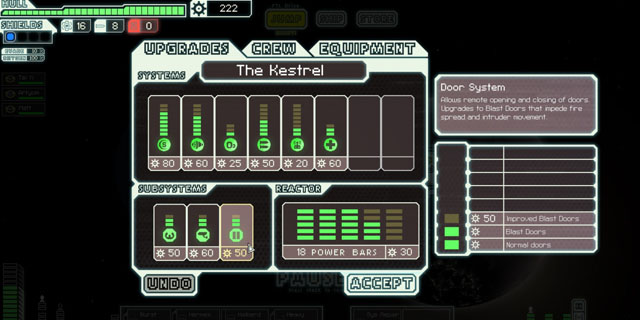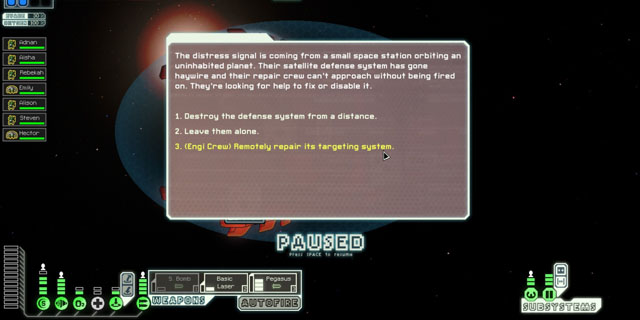
FTL represents the end result of one of the first really successful Kickstarter campaigns. Its author asked the public for $10,000, and ended up earning ten times that amount. Designed to be a roguelike in space, FTL delivers on this promise and more. Gone are the randomly generated hallways, though the sense of the unknown remains. Also gone is the knowledge that you can take time and explore, as the enemy moves when you do; you can’t stop and poke around every system, as the enemy will eventually overwhelm and destroy you.
More than anything else, FTL demands strategy, both in and out of battle. Strategically planning your route through a sector, and adapting to the consequences of decisisons as they come, can be vitally important. In combat, this involves knowing which systems to hit, and how to best react to enemy attacks on your own systems. It also involves knowing when to accept an enemy surrender and when to cut and run from a fight.

It is important to realize that your ship, not your crew, is the character you control. You must gather fuel to keep moving between systems. You also gather scrap, which works as a currency; it is used to upgrade your ship, and to buy weapons and equipment from shops. Also like any roguelike, the game includes permanent death. If you are destroyed, you restart from the beginning. The game can save between play sessions, but does not allow loading a save to retry an area.
Each sector is made up of star systems, each of which contains a random event; it can be a battle, a reward, a store or a choice to make that can lead to either. This also leads to the major mechanic keeping you moving forward: the oncoming rebel fleet. You must plan ahead, as every time you make a jump between systems, the rebel fleet advances across the current sector. This serves to keep you moving forward, and limits the amount of exploration that can be done. Some sectors contain nebulas, which disable your sensors, though also slow down the rebel fleet’s advance. You also can’t see unmanned rooms of your ship in these areas, making it difficult to deal with intruders and fires.

Combat involves managing your ship’s systems and crew. Major systems perform better when manned by a crew member, though crew must also be used to perform repairs to the ship. With this in mind, combat becomes a balancing act between attack and defense. Allocating reactor energy to weapons, for example, often means reducing the power of your shields, which opens your ship to attack. Attacks target individual systems, which can be damaged or disabled, should the attack penetrade the shields. Hull strength is also lost when an attack gets through, with repairs only possible through random events and at shops. Airlocks can also be used to deal with intruders and fires, though venting oxygen means your own crew cannot survive in the affected area as well. Because of these mechanics, combat feels less random than many roguelikes.
FTL isn’t graphically complex, with much of the game appearing quite static. Ships appear as large outlines, with an interior floor plan showing the divisions between rooms, an important view during combat. Weapons flying back and forth between ships are animated, but not overly distracting. The style fits the game perfectly, though if you were expecting an epic space battle rendered in HD, this is not your game.
The game has a simple storyline, delivering intelligence to the main fleet to turn the tide of the final battle against the rebels, but leaves itself open to imagination. While the randomness means games rarely play out the same way, the limited amount of random events means you will most likely encounter repeats over the course of many playthroughs. It borrows from many major science fiction properties with great success, without appearing to insert references for a cheap laugh. If Star Wars and Star Trek could find a compromise, I think it would be something like FTL.
FTL feels like everything a roguelike should be, and everything a space game needs to be. If you like either, pick this one up.
This game was provided for review by GOG.com.
Pros: Perfect mix of difficulty and fun
Cons: After many playthroughs, the events can feel a bit repetitive



















